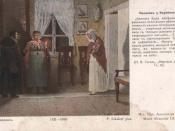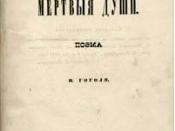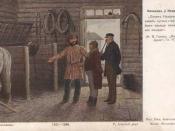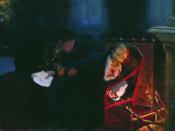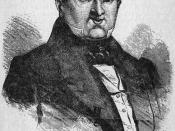Gogol?s Dead Souls: We Like it, But Why? When we read a novel, most of us are immediately aware of whether or not we actually enjoy reading it. Perhaps we like the author?s fluid style or choice of subject matter. Perhaps the novel?s Byzantine plot or memorable characters intrigue us. It may be a something as simple as an exotic setting or meticulously described romantic scenes. In actuality, though, we often simply know that we just liked the book.
And then one reads a novel such as Dead Souls, by Nikolay Vassilyevitch Gogol. The setting, provincial Russia, is far from exotic; the characters, especially the book?s hero, Chichikov, are not likable; and the style, while intriguing, is often erratic and digressive. But somehow, a large number of readers have made the transition from hapless consumer to scholarly critic in order to develop theories that explain why the novel is as successful as it is.
In the process of developing these theories, these readers will often discover new and fascinating aspects of the work overlooked on first inspection. The result of this type of close reading is often referred to as an explication, which, as a process, can be likened to exfoliation, for when one makes this transition, it often feels as though the separate layers of the novel may be peeled apart like the skin of an onion.
The multiplicity of meanings is what draws the line in the sand between mere fiction and canonized literature such as Dead Souls. Literature, by definition, must be a piece of creative writing with real artistic value. Without diverging into a rambling and surely inept discussion on aesthetics and the meaning of art, I will simply assert that this value may be discerned from three separate vantage points: stylistically, ethically, and comparatively. Dead Souls is a rich, complex piece of literature that may be appreciated on all three of these levels.
An appreciation of an author?s style is perhaps the easiest of these three levels to develop, and Gogol is no exception. His powers of description are indeed mighty. Gogol looks at the world as through a microscope; his descriptions are so detailed that they actually become digressions. Gogol begins relating the frock-coated crowds of the fictitious city of N. to a swarm of flies on a sugar loaf and ends up describing the cleaning habits of one such fly in meticulous detail. His lyrical depiction of Plyushkin?s decrepit abode rambles on for several pages. Gogol becomes so enraptured in the act of writing that he sometimes forgets his story. But not to worry--he does not forget his reader. Lines such as, ?However, let us return to the characters of our story,? are quite common in Dead Souls.
The tone of Dead Souls strikes an odd balance between fable and sharp reality. The narrator of the novel is overtly present in the novel, and he seems to take rich pleasure in the telling of a good tale. Gogol makes his position as author abundantly clear, often referring to himself directly, and frequently addresses the reader directly in a conversational manner: ?The author is quite sure that there are readers so inquisitive that they would like to learn all about the plan and internal arrangement of the box. Well, why not satisfy them?? It seems as though Gogol is going out of his way to make us aware that this is, in fact, a story being written by an author. This is a book we hold in our hands, and these are not real people.
But Gogol, in one of his many digressions from the plot, addresses his own attempts to make his story as realistic as possible. He laments the fate of ?the writer who has dared to bring into the open everything that is every moment before men?s eyes and that remains unseen . . . all the terrible, shocking morass of trivial things in which our life is tangled . . . .? While Dead Souls feels fabulous at times, Gogol?s attention to detail lays this town of N. before us as it truly must be. We are privy to all of the warts, blemishes, and fouls smells that so enrich our daily lives.
While, like Chichikov?s servant Petrushka, we may lose ourselves in the simple act of reading the words arranged on the page, we may also derive pleasure on a comparative level by drawing connections between the work in question and other important works of literature. Obviously, this depends solely on the breadth of the reader?s knowledge. Certainly, a reader?s enjoyment of Dead Souls would be greatly enhanced if he was familiar with Gogol?s earlier work, and even more so if he was well-versed in the works of Pushkin, Dostoevski, and Tolstoy. But this knowledge is by no means necessary.
No matter what the New Critics would have (or had?) us believe, we as readers like to guess at an author?s intent. We know what Gogol must have read, so if we begin to draw certain connections between The Odyssey and Dead Souls, we can only assume Gogol intended us to. He is leaving us a trail of breadcrumbs to follow, and if we do, we are rewarded with an additional level of understanding.
Dead Souls, despite its somewhat morbid topic, is one of the great comic novels, much in the picaresque tradition of Don Quixote. Gogol?s work, like Cervante?s, moves along episodically, with each chapter being an amusing adventure for our hero and his faithful companion--be he Selifan or Sancho Paza. Indeed, like Don Quixote, Dead Souls is a novel without plot limitations; as long as Chichikov keeps moving, the adventure continues. Both novels also do not have a predetermined ending point. There is no impending climax or final confrontation. Such is the nature of the picaresque--as long as the reader is interested, the author may continue the story indefinitely.
In addition, some theorists, such as Laszlo Tikos, have even established a valid connection between Dead Souls and Dante?s Divine Comedy. Gogol himself sets our minds down this path when he writes, in reference to the aid that Chichikov receives in the Office of Registry of Serfs, ?. . . Antonovich . . . offered his services to our friends in the same way as Virgil had once offered his services to Dante.? We can conclude that like Don Quixote and Dante, Chichikov is also a man on a quest, and the events of his story are his encounters with a varied cast of grotesque characters. Our heroes struggle forward, episode to episode, and as we move along, we begin to realize that each of the individual episodes in these works are meant to convey some greater message or moral.
But what is Gogol?s message? It is our attempt to unravel this mystery that leads to our ethical appreciation of the novel. Is Gogol merely attempting to entertain, or is his intent to illustrate a set of beliefs? Why does Gogol select the specific attributes for his characters that he does? In Chichikov, our hero, we find the mythical ?everyman,? or at least a character so nondescript that we are likely to cast him in our own image: ?[Chichikov] was not handsome, but neither was he particularly bad-looking; he was neither too fat, nor too thin; he could not be said to be old, but he was not too young, either.? Chichikov is a man of middling means--his finances are modest, as is his social rank. We know that he is merely a simple man on a quest to elevate his position in a most resourceful manner--by purchasing deceased serfs to use as collateral for a government loan. Chichikov is neither a virtuous nor an evil man; he is simply a man driven to succeed.
Does Gogol create this bizarre confidence scam in order to make a larger comment on Russian society? Surely, his intent was to satirize a bureaucracy so cumbersome that Chichikov?s plan could actually work. In addition, Gogol also subtly indicts the Russian institution of serfdom without openly condemning it. The serfs which Chichikov purchases are nothing more than names on paper--not human beings but tax liabilities. It is not until chapter seven that we begin to see these ?dead souls? as more than names and job description. It is Chichikov, whom we have begun to suspect is a despicable character, which breathes life into these names: . . . it seemed as though the peasants had been alive only yesterday. After gazing for a long time at their names, Chichikov felt deeply touched and, heaving a sigh, he said: ?My dear, dear fellows, how many of you are crammed here! What did you do in your day, my darlings? How did you get along?? It is not that Chichikov is an overly sentimental man. While some readers may wish to vindicate him by interpreting his purchasing of dead souls as an attempt to honor the memory of those forgotten serfs, Gogol never makes Chichikov?s feelings on the matter entirely clear. For all we know, Chichikov is merely an opportunist who feels a small bit of gratitude towards Stepan Probka and the other deceased peasants for their contribution to his financial well being.
But while Chichikov is a complex and shadowy character, the landowners in the first volume of Dead Souls from which he purchases his serfs are relatively one-dimensional characters meant to illustrate various elements of Russian society. Each of the five landowners, although meticulously described, are stereotypes. Chichikov recognizes this, and deals with each landowner in a specific manner. Manilov is the dreamy sentimentalist who pays little heed to the condition of his peasants, leaving that trouble to his corrupt agent. Chichikov capitalizes on Manilov?s strong sense of camaraderie and receives his dead souls free of charge. Korobochka is a paranoid and isolated widow who eventually brings an end to Chichikov?s scheme because she fears that she has been swindled in the sale of her dead serfs. Chichikov uses her fears against her, and she capitulates. Nozdryov is a liar, a gambler, a cheat, and a bully. In short, he is the stereotype to beat all Russian stereotypes. He, as the epitome of the reckless and irrational Russian landowner, thwarts Chichikov?s scheme by not selling his dead souls and later revealing Chichikov?s true intentions to the other gentry. Sobakievich, unlike the other landowners, is successful, but at the cost of being a complete ?son of a bitch? (if his name may be translated literally). He is big, strong, and gluttonous--the typical ?Russian bear.? It is he who drives the hardest bargain with Chichikov, and in the end, actually cheats him by passing off a female serf. Finally, the miserly Plyushkin haggles with Chichikov down to the last kopeck. Plyushkin, once the most successful landlord in the vicinity of N., now hides inside his dilapidated manor house beside his ever-growing pile of collected bric-a-brac while his grain stores rot away. Chichikov finds doing business with Plyushkin quite easy--it seems he would do anything for a few kopecks, although the accumulation of wealth brings him little pleasure.
Each of these characters are meant to present one of the many faces of the landowning class and state bureaucracy that Gogol satirizes, as are the buffoonish president, good-natured yet corrupt chief of police, and plump, gossipy women of N. Gogol is aware of his stereotypes, and even acknowledges his use of them: ?Perhaps he will be called a stock character and it will be said that there are no more Nozdryovs now. Alas, those who say so are wrong.? This is not to say that Gogol means to satirize Russia itself. In fact, he is fiercely proud of his country, and often digresses to laud the virtues of the Russian language and various inherent Russian traits. In fact, his constant remarks deriding speakers of German and the penchant the upper classes possess for speaking French at society balls approaches xenophobia. He lampoons those elements of Russian society that he finds abhorrent and seeks to present his moral lessons with humor rather than ire.
So as readers, we learn to trust our instincts as to what is and is not ?valuable? literature. If at first attracted to a novel because of its stylistic appeal, we delve deeper into the text and try to discern the separate layers of meaning. In Gogol?s Dead Souls we find entertainment. But, as we examine the novel?s relationship to other texts and the deeper, moral implications, we discover that perhaps Gogol had something else in mind.
